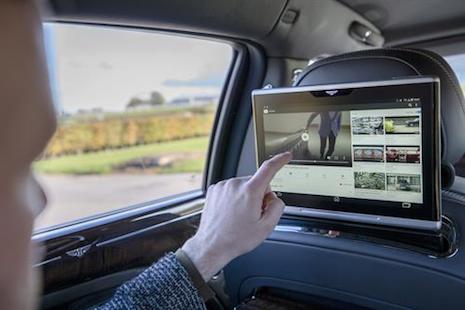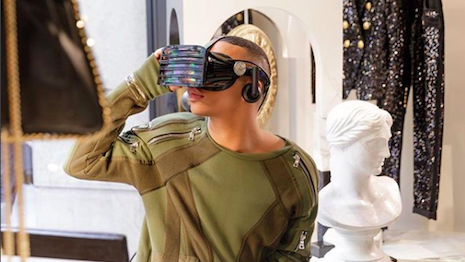NEW YORK – As technology continues to tighten its grip on the luxury world, it is increasingly important and more challenging for luxury brands to cut through the noise and reach affluents.
During a panel discussion entitled “Developing New Customers in a Digital World” at the Italian Luxury Summit on Nov. 7, executives from several brands discussed how to project empathy and personality in an increasingly digital world. The panel was moderated by Chris Olshan, CEO of The Luxury Marketing Council.
“Brands should be wary about latching on to the latest technology available,” said Kyle Boots, director of social analytics at BAV Group, New York. “There are great tools available but they are not necessarily right for all brands.”
The Italian Luxury Summit was organized by the Italy-America Chamber of Commerce in collaboration with BCG and the Luxury Marketing Council.
Tech balance
Brands need to be aware of emerging trends, while treading carefully to avoid investing in technology that may not have longevity.
When making large, long-term purchases such as a new vehicle or home, customers need to evaluate not just the technology they want now but also what features they will look for in the future.

Luxury automakers have embraced connectivity. Image credit: Bentley
Luxury automakers have been focusing on connectivity for several years now, but many continue to make improvements and adjustments to meet up with consumer demands.
British automaker Bentley is the latest to appeal to busy business executives with the introduction of secure, in-car WiFi. Automakers are answering consumer demand by integrating more technology, from wireless offerings to advanced audio systems and mobile applications (see story).
Augmented and virtual reality continue to make inroads, but the panelists agreed it is difficult to predict which uses for the technologies will stick long-term.
For instance, Italian fashion label Gucci is using mobile technology to help consumers decorate their spaces with items from its newest homeware collection.
With the Gucci mobile application, users can use an augmented reality feature to virtually personalize their space with pieces from the new Gucci Décor collection. Luxury brands have begun to embrace AR as a way to bridge the gap between digital and physical retail experiences (see story).

Balmain is one luxury brand that has experiment with virtual reality. Image credit: Balmain
Technology fatigue should be a real concern for attracting affluent customers.
Personal choice is also a luxury component. Brands that allow customers to choose how often they want to engage with technology may prove to be more successful in the future.
Most panelists agreed that they themselves have begun to look for opportunities to disconnect from technology's omnipresence. Because of the overwhelming tech environment, personal touches such as handwritten notes from brands still have a large impact.
Digital reach
It is a different story when it comes to using technology to better understand and reach costumers.
Quality data is essential to luxury brands looking to tailor their marketing and service to consumers' needs and desires. The better the technology, the easier it is to do so on a larger scale.
Mass brands are making strides in one-to-one marketing and how to react to data points in a way that luxury needs to learn from. Burberry is one of the luxury brands that is learning to pivot towards this strategy with a variety of digital tactics and using video in unique ways and leveraging data for detailed messaging (see story).
Digital media is crucial for creating a consistent brand experience across all touchpoints. However, as Eleonora Paulsen, president of Gruppo Italia, explained, the most valuable consumers will expect more personalization than automation.
Personalizing consumers’ retail experiences can lead to loyalty and increased spending, according to a report from Boston Retail Partners.
Today consumers expect more individualized communications and interactions with retailers, with 59 percent saying that personalization impacts their purchasing decisions. Identifying and appealing to shoppers with relevant offers or communications can help to establish a relationship between consumer and brand (see story).
"Things move so fast we need to stay agile to recognize what the opportunities are, while being careful not to jump at the squirrel," said Sandy Edry, global property specialist at Keller Williams and The Edry Team, New York. "Be open and aware to what’s possible."
{"ct":"HZ3lqlxtNsYN8KbR5P\/kGv5d+dLAUkP\/VqLm00MhV6QFmjwBXmmdtlgoGDnIb40UcgafJZsPq64wVcUU1uO8gknLTMKo7029Kvqfkqf9QCrhTKP0ITybsokc4EzTNabBk34N\/7WOJsN4CfcOhdh8+4cI6kPcOKK8KEmxaFp9zS9E2Rq6s7emuJ9NkIH66oIc9DV5B7pE2tP6jkLBpKdsneu0fNvCUZHH9qjX16sxt347SH9pcoLt\/TnPOfoV\/enNOh3QuUoWA89DSHXTjAzP5NHeQli4ZtKjkRbmQwKZEpED3bC3Pu6XNMQ0SHLhE9RLqQdI99TK4PpE99IYP5pLi5W\/vzoZA7aKqedHUEl68TpFScPstj2wOtECK9f\/ctZQnbVkAvSHxm5CJ0XYQKjhUdkZBPxrE7RJtti7TmfZKXRd8Mm3wu0JTGSxrKotXOrgPRfxKopgWIlDyOaFyXbitV0\/ypGfURxwsJghyu4GdWQbs3xZIFHK+Qv92kZJJKTWkvwnY0YA4gzlsuuXXa1QUvNEfnd+pthxMkLakrwAb4kOdCWJxEU15rFPk83ZW9rJNmgGWvUbPWOkmN2IzUNVmbbWKh+Tw9lX8g67ghi46HxgLKUTQLCxklnteQqnwgO0G0RDe+ZQtc9PQ1txxGSanbTLRH9V7o498iQz1gGti7oPgkM8Je5UDrKsB4MrSbmT7zQl9b9xkFzscn5rmRGR6mMi0itnRy+26NbKqJM6Wlh1n4HpASgcEdUsiZzmCpMvtL8Vn6JSbXeVxAPLHW+xHkkgAr0QpORLhJjK6y18s6Hj\/g97\/gy\/UBJeMQuSFRq4RvodvtTpsuYfxUAHehZi3sO\/EmcZTBN5jZyuzKMvD32LbgugMT56TqNEeeD5i5aBfzpKV7ZtSq\/7e8e9pwreyw3ADxC6aaMmwT9Zb1wapNRppK4TOZJQe7wl6mjYUCVSvLTpGpdIjY3m1GVj4fVPspCJZKj1UGTFF784tvhlBn5zW0pOLtZO+b\/bHG2joCZ7N\/yRDbICfYLzKl1pAXViZxFr3YJxqnkp3DIXTHBT97OsjmwIMbCUBEktwFo0\/dPHq2f+d2ROpCC7w9hmCRXCY6BNMU6r76TKkV3Lq3kdoIVcMPKK3A38TMXKpYCFWTulQk\/PRUzEyqfOkW02IZMRapTO0NV6hjP5k7XJqwFrIvAFNUbZp5aEOoxlbVbMHr9\/cWLRVf0GQz08jpRu7sGGXrk4ISMExstQoIrWUdZqCL4\/VCeeD4Nw7Yw\/TbNB1f7ia\/gx5dqUWEwIgnVKgj5\/1dHcHyOHje6An4JELyAJ\/9k+WoyGMhPPxzNf9x8LP9cdUmzGp3SHSI2dDnuJe3lhj831YfXME6V1q4ngf2A5mCMJhACNzr0bC0ZpuDGQzGwtoXEYLes3GaDtgcGDAuJNGFvpWtcOyyTaMVsbKrcZYhLK36Qjs4CqLWt7vIOeYabtI8gswatODHhdeKfzXdCN33gCbmh7g0amxigmLno4xdISo7SSBofnBPsDios7IRbuOTJYKvSuRFAtxFTokB9Sna\/YERakRnBwnJEn+WcHorWKSi\/OByerXTQC2pI1FtMVPy\/zmCFibiePdX5u6fNDNtrHSpRkb45RMF5Pe267rdKCSu+uph++Idifurx+75UCzO+GS0ufZb00tdd3LFEIlxTmgUsl0o3UXBfl\/XczwITQxU5t+uFF8vZl1MEshZeqH6P1Cgbu1M3stVQkbA+QYLpChmxpr95xaJprgw5O997SyGAcUw47lqOcyH\/P9gx74T7zEnguJvOb4QFMItXqSqc5aaR5nJK3Go9DwHZw5EfNqaEKtBNSYdYuN3xiniB\/K2aiSEuEqMohNy3aNokeyXWiLhylg+vrGlAwrVkb0L\/EiHTY7kKt9gKjTspWBMQ58cGIbFqC8MTLzewHvncqDvVINFZwl5IxC6lVnkLIpNbiIx6FMDw0DHJ1Fqe7E12r0pfE3r5gFI9w+D8Xj0mQ2MHIIch7Tdjo107pSQcsuHQX07wCMlxl3xAgeDxtwNEUYG0uZjx2WL7XRC6OpN28UCqiBOgctEEnSe\/BgYmoB4u5MVngV5rgjmH\/nk7yeDruVMphxddsKLQaY8HBeU2YcDcJHNjCfOt6JiPdFwmBB1MTLq3CJJigUbKje4fuHhPCKhU+wX3Pm0FDY6KaZY758\/IsUJ7yUrnyipHuWf8pPaW2w7R3uEjVrXlwgFpLREH6N9UUvgarfS6dZxyw4o5h2lZKnOh3WaagPGtDmDFUho1\/ulLUvoCZBozN5l5y7Yd9xx7XJbPDfGDisQZASBaZxBbKyoZcvJwNRgc\/Zx7Qo4qRnSaOqgyXs\/igAnvNlvh1OzvQnnP7TJCQw5Xpzq96wwTsti\/IKUECg3jlqt3qkRZ2qKOGnRRm9A8yfqXsVngpcEqBTiUPCTQkYhhA9mJkyL+71FOJali8qt2dAjSZDa+v2yPOK94t40KJ\/UIcoxYE52HSgtiV3dEXDIyCPXkqO2I8zG8dhY8wd7amjkhbRh91tOn+xtL1kp7HHPvpUiKdcEXJZq6ot4uO5BkX18VJ61MsStAOJ4ZE+qQaU\/oId3vX1S9gyeziU4j+0HFlbZfXpzc+8iSmkVHfUByvsoXr7SvQD8luk\/rObadw1K0J6h28VRi+WxTJ6A6eq+w9vLrSnBsIf3AKzJwHwAJu4raPHxvHqfNoZDmKZUZJEUia0eukz1FFw6c\/K361p1JeZYqnqXcK1By41us83CHbZX\/U2s2eRPSNyfXLwLFxdQ521AIM1l1Q914Wru0VW+85LNnGPFh0qqrz\/7M1YGixZlMGkeEw589UVcbv6ktN8Z64\/TWDofaqQI11FilqrCc1GV3TEbCr7vdToyI\/7ebNr3iiM\/Ihti\/ckmHeDlencT80bCTubueqURkSHoGQujw+EHfoUp7O5UDn5aauO8JeOvCimLP8d88j3B4ogD6pZ9O4OtxxqGxg2oZgrQKtyBFwxyMV31KCRNJfaf7EMZgzv1ctMAddZ94WYkbHaa47nvIKf0807F1rASvEHTKcHEWyc3EwUeOxqqIS7Ulxsn\/Va+bWjmYJoNqLoFCRvkUkJgGWD6aI6QwsolhtQSFD93C9aOY9689Ai45ayjr9+KY5E9BzGRM0CIO7Vv3rcD9iO6iS0hy1VcNAz7ov9xgn7XW2uH2JFtMw8Qv64m5bHNXVbYzVKamLrTV8PRk7lI42R+Y5W5NVVdyuCA2DEYkhNZVZGT914VCXq5JfGETF+SVn0qls1d4g76iKTOTe7nmlDscKjW65K0OEFOECOdNNwuDigUUgBuJZOgcKyAk+9tIx1noa5tPPmnn81w+kckq6w1BhKPBWqYPTBnhlkMAIYsKtzqlnlE+OwTbsb79Ti87Tj2id56U5vl1116CuRyfbUmcLwFNneXgosah35+nVd+\/TsUtzLINSTV6Otcg29yyxqISAaujBIz\/xgQnnXk\/\/JECJzhPuFHtTOdTNg\/ALiEj1ASCwtpF80F2kwlOVjpzJpWb23iCwPw35xo6dxEucIEm3jwmkWImZDOE\/6FU9JtYwGPOSrSjRMwg8fOJD++wzwjGatOxmhWPi545sqbQtRltxW49wmAmQGnsMqllpGm+GoZDxb\/QMhnN6sJ8wSZYTfvzaB5WlYxZlito8xqs8p51wYuPzo+kbuxB8NlQ+btdI30yM+xc0kC1aGGh4686Jb2kHmcuTJST+Jsd4SlwRblkl\/KEQRUbZUoqBeYZl0EDg44GZacAOMpwXnudaa5fGAdsI4B7k263\/sgkImGSjIUjicsgP94nBegykG1kxA3KitB43IGsP\/Ci\/iyKdMWqiUbcsI18D8onKTRr02KSZye1hLlipOJ1vHbk+Y8VZw+u6DrroRJjw4BbBuuRIJAIRZnS1tq6eJJ0Rk4TydtF5VybN4gTn3HqhYOlDeiw5NFsmcxJt15I3KkllF4LB0NjHDSMVIvxrVUCJ8EuCPfYI4hdoDlKp8D99ezT9U\/xMEeb98xyXZShIVq8XdvX6mSQ+\/gojYhDVCDZ82hL4Lu\/y36SgHnLhw7cSSmsiwMXrHn8020uarcsLXve+5s9wMz8c\/\/6tKwCPvQDib37+ka1P6njWDzDyagQLGOUrd5CUZErYmE8sTFVUe0EOCp1CQuEZBRp16MnH\/LBwM9tkvexg8uuiPRXKzXkDM7YAkkF3EbQDfK11xpSpBnGLAx5dA3YgmdF2WfRxLBTWbtanZdOczcdKNWTAXLQvOBE\/ywfkOahJG\/To5OLeTtBQ8mHeP\/8UTmsvCUCEvr3jd2uLEQInYU0WUd3+TXLYuiGXLXJMx+qGtBmZUv5ehZsM7l+DSAftEpF5dDTa+k+WdwKAULZgfMyEXIatfaf6qknS26Aq\/esCTp3S6SXfZpqaX\/2B4vsyfyrzkxiA1SSFBWAX7ff+YEfAm04lP+pc7H333ODKocmC\/wmJEpf7YvUs9rFnLkGht3JvxAABWPPk4p+YctA5YqKLospLOnsbl3AjcypX5Bj0ypEfhSgra0ICD2HHRoVWUTWikGvyJ0xIrxnwGlMrdxVqNyE36GPFFgIHhVLoWFE9I4mqz7FQQEX6JPpG2bO+193K3pa8j8U+h3SiD\/8iEK0SyEW8OLEjFuSaWB5lVZt0MoN\/eqi0b9VhUGXwzKBcVyhO4\/Fer0xMRa2Nj\/XpRnpV0dM6CZk+W7flWTjQ57LKN8\/B503Z6KZG4a1XWoV9BL3G9RY4p9zqOQxaNCDSMD+9ExeUA3l8JlMF95oCcrFCTZ0DU6A5\/xEpQ6ZRa0bJCnP1ybBbQTZdSlIuWLdjuqLJY+M9\/WszRvSfdcRONzgGbpwLml4WAWxNA4VSyUvpUB1WoezWSHUuyBTm5XVaRqksWsWJUTdMrpckn9Fjf91c1Q5lEGDJsDyOCRLdIFZ9HPBKum0OGVnBxIw5saAMpPIqktTXbUiDSd0LhnUgYNvW9ByZjJaA7L2MI\/SEPf37Jzmb+Ww0ka3oDeQTJNRIeJnPanZgYELl+FRuTNdJoQMMTEl9ooKAo5qvBhwDoIvApNogmyl77iezZQvkw9RKNjTlh8M4rlkV\/5JlYxzlNdk+7I79iDitN6bhNFYylqbs0jdejhGBpX3a3+9FdOw5FHOoa9RLeMW7mWg8Lg+h9v+MGa0na2bWwoXOqx+mojk7ir27UCrs26ZaPk2qIek7ppOZudYv35Wkcf8ZjYmAsXrzjB+Sm3AFNumY3vkbArp8a0hqTLr22Y8MC26kfBYpEA9z7eYl2fCYqYh03l1pvo76OhuIIYdk3TXusl9H\/hhEErjj1RhSvVySv0QevldN2MnVVH0L3Kjl6oA9X3iWtuUDU2qYQyM0HJ1w\/yQ3yCxdEsWNFILqENxGslQAvULvCxLx9IyiplFmT9fpOpocBgMgD\/RL254tD9QrxHMsjhaP8r5tjBv3Zb3qNkqUgrExaJO3co4jpO0xSqwoIQTDMjYXyXOWkIlnA287KlauRG6SR7M3DVAjjHvU8UlLqZeLeSpQgNeRlXXcdNLd7y0VKds\/UuMAPPK7aZ3bARsjGspG29qSmtByvirX22I1QdnBS8tB01qXyhdZ4KpYI7YSrsbEWEBfV17KHeQpvTPbr\/UcwKFVCHgXgxwTURvE5s5NwC\/nJdHvdllmS1Fc54bBaP6Ufv6GF4B0guGWWz6ub75sN76jbWBLY7qW9H5OT\/890iAt0FwqB+UNVjmVGku8xNtr4HYApRNT6vKR\/5v4TtAAuItqxGJ\/6zYsxnZ0nZGqbNW7+sWSpX3a4z9Bt99Ynnkx9YjHwWDClxNvkPmwE9z61fvk8+LKVqProqdEzswYexy5QHz4a6NpnwN57J0EazJ1agkb+qx3aJzaFACc3XxBQ+h2j7wppmagxuJZ39r\/bEMQzFf5GWuM3jPzpXdmvEi2EhoUJItI4k9eMcQUbD+Q4zfI0XImMHQH7cwp16sJnEjDOgsZLKWkm\/zM4N5RiRg7o1A9mK9zSK9MQTzZIl8xN95ar7xs+U8w7h\/bDGYo6f6EzviJLq7\/X\/AKZjOGWeZKYdhCxpERlm6TkahaYqsZw+hVsvm0+CeBpi9P3shFhKf8HKy38WD2DSML3QFbYcC5ySBXlboelCH\/jz6zP1pYKyRJYPbb9OqL+Gyi23JAsXfWBKiGKCygsbkF2o2YWT\/s+Bf3BMUul\/C9MJIUH3\/yIxYVwRRjpW0L5AJJgW+lhSI8q83Flxg4M5zxYWFrXFdrUrHCQDE\/jCATaXEQCT62Dyfpbv8iSXaDDs\/Vtcigfyd1KSeODtajYheUvNdkVU9ely7KzSdJn0Ykb651nX\/VFNoB+WIIBl9E0H8RQfkqUrQHT7Nk0b1Fm1DYNVUiASpWOQU9SP1AArb0L9GEf9fxa62bBRju9nX8tHtPTULuuWm5t4eUmN1iLAHhdSJkCqD2ilI8Y7jaVuEgz2vYV0mBFIacsJtTnOeVteqFM5ODMUksxBzk+IcFrPA2+LWch5cNKXq853scjCXvVQYkb8g748FnkoRRnFiVNP1YEObMfkI9qnCCI2sK5MmzFvDUpjbgGgWhzhKbcSXZtuS4SSlCKmwZBW6jVINv9wUsKeSyWfQd8FrZefWulIwiPM8F2X1NqpHU8ouXWxquthi5pZhrmXPJTA+nTCUCOdujTDNX0gTdNGP03nUA2a2u4w3EKGFnOOw6Uc4kTnVIsTpwqyC2Bg4XlLWLAwsxB\/JiF+C5QhAVSa\/4yoXG83\/cJ4sw3PpsLVnnxV4rpX87fBb+zyAlb8IsY\/9YiT4nsWO7Ti8uiayHUimFvbDS30iFDthHnyHhCvvgjy80byKEcZ1ONowri6ENl3pZruNZWul+OWa\/HYCKTOsOtg6mXThqWgoKqfLoPAbHxJo2xs0QvqHTcYYdI5EONRd9xOR1EWp+XWl1J2s8CaNlTEW40WT3kJj1zg+ld1GEQmLpe5gLI9WyqhaYRlHVRrrIpPAtIfy46QzEyrsYFChg3Seg0k1iRf6Z58\/8xvOvGxZBqGKPCkyNcE+c09WKlaIMAKub5zhVSusfWYkIc\/SFyZGGpy6ZV8ussdKwGPDbrrNkzvV5QEihKmGK5NHFlbkvEHob\/d1wQKjarWtN9MqRQZOqF7bAnVy19zNXjgmCNSp0vExHcr+6oMEwo2cJFGmiUgjv\/0jVzfxV4ShhZjSj+kLNb5R78l743tVysAiRXzFVJ6WnT\/p5SSGwVslqs8HTx63hgHLcuWAhVY512VjX9JaHospFMhpykqw9lQBtknE0BBCvu7nfJw0Z6fKopADqb5KZL+2tAtxMWbSh8u4jpi06JeQAS58M2hM9L8SJghG6FyUiFm+oasK7rhplGVBM1AgU0JHsxj2ljJViP8P4aOUTSJhTeqEWP+BoEJ4pBub6LmewBssWJ7Z22yd9pNzlkn4nVlw1bDTMm8A3eZ\/66xIJ8j7nEY+mp\/APHoOua\/5QuDuYHbrZxMu6IxGxd5J+Qb9WnODxr5VZFLgb0mpJoZQDSvhXTqcOLOg2b\/TcyNb1YHSxNx9crw7Nkrr9g0k58Mmywb+WADODatruQOj4m86VjXhaUjQkYgVvK718miniUH+pZ6Q5zXXUa3RmK27azFvGaDiTHUc\/ttvH9LrN0Wisk57pEx9Dq2dorrOzlFWqBWxJI3\/EIbH7sOG263OllTbyKtKx5N7Px091Zkll4ACTGrY50NvZZRpsxTjk7bKI8AT7Z6UZx63yq5VNc\/f2guGu8TidiRFPTfuJ3GKJ8USbaImkMvhMzmqAHIcNx1Kexe\/DjBCOOMU03aUxRmpLlCASm9HtFIH7msOY2U0S9z\/l2BRJ2fQatCeiRiv7aIpBSIY1bJRL5+7UkovBhWyiGeSzQL6B7S7SiK7gaBo+awH3hA0OkdmzoWh9Xut1fT9xt9uV9blkpadaLXgU1CpoT6YZ0lKOXWR6RrhoGwLr8dbzHYUtuhoG7qFXFTaQgCcmCCUugzy9\/rcXUCUXq\/RsfHOZTz1AvA+V1XYY\/z7YrAAbT53uFt5HTNgqkKxMYu00B7TLMCv4FurNN1jXEaBIevYh+X1ne02\/GaJ9YjpkL7v8mBgfwohtNjjt2mf7vD5ZoLj0gWpU+sFXU1sMHUIjXKUuLcXyXWsbKX8bKer9MTeVpFoXpmRRYRO3vXmFNnhKgFhgr4LoIvOm\/3igmtvETOhxnrPPj8ZuDxE8lCq0ZZa7eqCFYhTlyDJLK4VHn2T7AAvYhAbJDYJCPDdknHYqHCDYNzjHNhDQV4lm7Lc4OPo8S194fh38DPBypjCxJv5ZZnl1Yj1lM\/yZJ3mQRmUwfcvx0MdyTKKdNYAuqLiDgD\/rFbBL4oMQF3FOXwJc7pxLnGO7\/dSDZmd2JW4VGu5e3ESS3mAeKSqdy5wvoM\/EnOxGX4fOcIHdu44wtEZap0uXq2sopiGBq6YME8PeZWWtS13+iGsxfcPqo1T+gJs8VGkmo12Fqml19yILmNvc","iv":"41351673fb3bd27671316348608e478d","s":"7df63bd5a7360975"}

 Gucci is one of the most influential brands in digital media. Image credit: Gucci
Gucci is one of the most influential brands in digital media. Image credit: Gucci